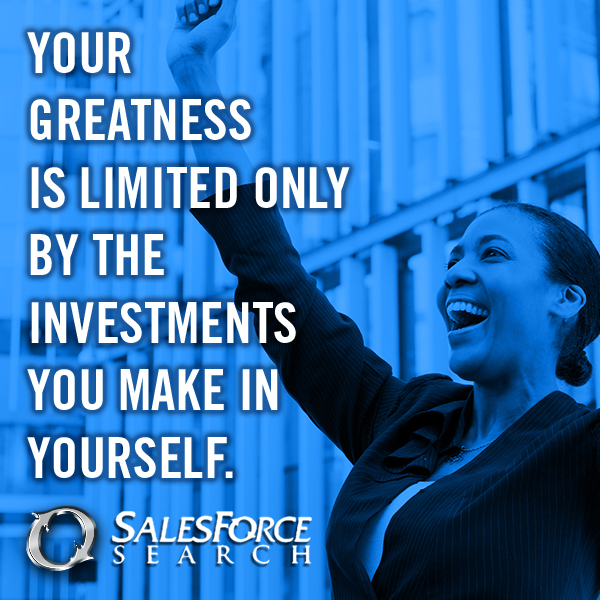Age is just a number, right? When it comes to your sales career, it can matter and affect the next steps you take in your professional life. The odds are if you are readying this blog you fit into one of two categories:
- You’re pushing 40
- You have an interest in a sales career (if you don’t already work in sales)
As an experienced sales recruiter who’s worked with sales talent of all ages, I can tell you that no age is too old to start a career in sales. But, there are some pros and cons to waiting until you are 40 or older to get started. So, let’s talk about them.
In this blog, I’ve outlined:
- The advantages of starting a sales career at 40 or older
- The potential issue of waiting until 40 to start working in sales
- Tips to have success when starting a sales career at 40
Is 40 Too Old To Start A Sales Career?
I commonly get asked questions by job candidates looking to make a career change if starting in sales later in their career is a good move. The advice I typically offer is that sales attract professionals from all types of backgrounds. Success in the sales industry is less about your age and experience and more about what you are willing to put in. It’s those who are motivated and have a drive to succeed that have the most success.
If you get into sales later in your career, you typically come with a wealth of experience and soft skills that transfer well. You also come to sales with a unique perspective, and greater confidence and have a rolodex of contacts you can leverage. So, yes, you can have a very good career in sales, even if you are 40.
“The best career after 40 depends on your skills, interests, and goals. It’s important to evaluate your existing skills and determine where they can be applied in different roles and industries. Some potential career paths to consider after 40 include sales roles, marketing roles, product management, and customer support/customer success roles. These careers often value soft skills and offer opportunities for growth and advancement,” says Stefano Bellasio from Anthropos.
What Are The Benefits Of Starting A Sales Career At 40 Years Old?
There are always companies constantly looking for new salespeople. There will be lots of diverse opportunities regardless of your age. Here are the main advantages of starting a sales career at 40:
- You have more life experience: At 40, you’ve likely accumulated a wealth of life experience that can be valuable in sales. This could include strong communication skills, problem-solving abilities, and the ability to build rapport with people.
- You have transferable skills: Your previous career experiences, even if not directly related to sales, can provide valuable transferable skills. These could include project management, negotiation, customer service, or industry-specific knowledge that can be applied to selling relevant products or services.
- You’ve developed your work ethic: Individuals at this stage in their career often possess a strong work ethic, honed through years of professional experience. This dedication and drive can be instrumental in achieving success in sales, which can be a demanding field.
- You know how to be professional: By 40, you’ve likely developed strong emotional intelligence and professionalism. This maturity can be an asset in building trust with clients, navigating challenging conversations, and handling rejection with grace.
- Great earning potential: Sales is one of the few fields where your income is directly tied to your performance. With hard work and dedication, you can potentially achieve a high earning potential in sales, which may not have been possible in your previous career.
- Career growth opportunities: The sales field offers various opportunities for career advancement. Depending on your performance and the company structure, you could progress into leadership roles, manage a sales team, or transition into other departments like marketing or product development.
What Are Some Of The Issues You Could Encounter When Starting A Sales Career At 40 Or Older?
With the good comes the bad (potentially). While there are significant benefits to starting a sales career at 40, it’s important to be aware of some potential risks:
- Ageism: While not always overt, age bias can exist in some workplaces. You may encounter situations where younger candidates are perceived as more energetic, adaptable, or tech-savvy, even if your experience surpasses theirs.
- Starting at the bottom: Due to your lack of direct sales experience, you might need to enter the field at a more entry-level position, potentially impacting your starting salary and responsibilities compared to younger colleagues.
- Steeper learning curve: You may face a steeper learning curve compared to younger entrants, especially regarding specific technologies, sales methodologies, or industry trends used in the contemporary sales landscape.
- Competition from younger candidates: The sales field can be competitive, and you may face competition from younger candidates with more recent academic qualifications and potentially lower salary expectations.
- Demanding schedule and workload: Sales careers can be demanding, often requiring long hours, travel, and meeting tight deadlines. This can be challenging to manage alongside existing personal and family commitments.
- Stressful environment: Rejection is an inherent part of sales, and the pressure to meet quotas can lead to stress and burnout if not managed effectively.
Tips for a Successful Sales Career at 40
I see candidates who have successful sales careers at all ages. Whether you are 24 or 40, the following tips can help you have a strong start to your sales career:
- Research the industry and target market: Gain a deep understanding of the products, services, and market landscape you’ll be navigating. The more work you do upfront, the easier transition you will have once you start selling.
- Highlight your experience: Showcase the transferable skills gained from your previous career, emphasizing communication, problem-solving, and building rapport.
- Network strategically: Utilize your existing network to find opportunities and connect with potential employers and mentors.
- Focus on your value proposition: Clearly articulate how your experience and maturity contribute to the company’s success, highlighting your ability to build trust and navigate challenges.
- Embrace continuous learning: Be prepared to learn new sales methodologies, technologies, and industry trends to stay competitive. Something new is always on the horizon.
- Seek training and development opportunities: Enroll in relevant sales courses, and workshops, or consider getting industry certifications to enhance your knowledge and credibility. Be a sponge.
- Manage your expectations: Understand that building a successful sales career takes time, effort, and resilience. Be patient and celebrate small wins along the way.
- Prioritize self-care: Maintain a healthy work-life balance to avoid burnout. Manage stress effectively through exercise, relaxation techniques, and setting clear boundaries.
- Become an expert on your product or service: In-depth knowledge allows you to answer questions confidently, build trust with clients, and address concerns effectively. Put the work into being more than a sales rep, become a trusted expert.
As I said at the beginning of this blog, age is just a number. by capitalizing on your experience, diligently addressing the challenges, and continuously developing your skillset, you can set yourself up for a successful and rewarding sales career at 40 and beyond.
Check Out Some More Recent Articles From Our Sales Recruiters
What Sales Jobs Will Be Most in Demand in 2024?
The #1 Quality Sales Managers Look For When Hiring Salespeople
How to Use ChatGPT To Write a Sales Resume: A Step-by-Step Guide
10 Things Sales Headhunters HATE To See On A Resume

Brandon Biafore
With a background successfully leading sales teams (overseeing training & development, driving sales & revenue, and ensuring delivery of exceptional customer service while executing cost control), Brandon is a sales recruiter with a solid understanding of what it takes to succeed in sales leadership role, as well as the challenges faced by hiring managers in finding top sales talent.


